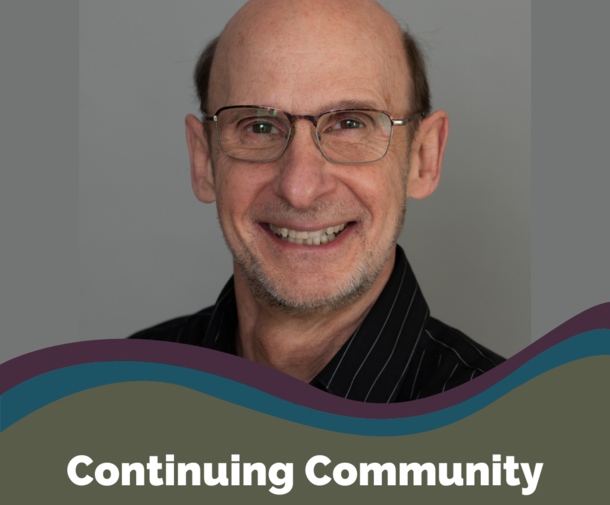Continuing Community: Following Steve Buechler
A Cancer Story: As Good As It Gets succinctly tells Steve Buechler’s story of being diagnosed with acute myeloid leukemia.

Email correspondence during his 2016 hospital admission evolved into “How Steve Became Ralph: A Cancer/Stem Cell Odyssey (with Jokes),” his 2018 memoir. Now Buechler passionately continues to write whether that’s on his blog or as a contributor to resources like Patient Power including a five part webcast series.
Many intersections hint at Buechler’s personality: boundary waters voyager, poker player, professor of sociology, rock and roll drummer, and cancer and stem cell transplant survivor. In conversation, he is approachable, witty, and embraces the facts of his experience. It seems lately if Steve isn’t writing about survivorship, then he’s speaking about it as he jokes he has found a second career after retiring.
“When I was undergoing treatment, one of the things I really wished I had was a conversation with someone who had gone through the same diagnosis and treatment.”
Buechler discusses his active participation as a peer counselor for patients. This includes over the phone for several organizations like Be the Match and the Leukemia Lymphoma Society as well as for spaces like the American Cancer Society Hope Lodge, and teaching a writing workshop at Gilda’s Club about the healing power of storytelling. Before the pandemic, Buechler visited patients on his transplant unit - sometimes in his own former hospital room - twice a month for three years.
“It was powerful to be the person I wished I had had back then, that really awakened something in me that recognized this is worth doing.” From his experience, Buechler realized that interacting with patients and listening is often what survivors needed. He acts as a sounding board that empathizes with the experiences of other survivors.
"There’s not a lot you can do to change the physical outcome of the disease. But there’s a lot you can do to keep yourself whole. If that contributes to the outcomes, so much the better."
Buechler often frames his story with six aspects that helped keep him whole - writing, mindfulness, physical activity, a reassuring worldview, a proactive mindset, and humor. You can find resources on these topics throughout Taking Charge of Your Survivorship, and he explores these topics (and more) in posts on his blog and Patient Power.
When he started writing emails, Buechler thought he was writing to keep people informed, but quickly realized it was a form of therapy. “I could take all this scary swirling flurry of stuff going on around me and turn it around into a plot and a narrative. I could apply coherence and logic to it. Doing this writing allowed me to be the author of my own life.”
"Every telling of my story gives a little more insight into what happened and how I managed to survive it. That’s why writing is a powerful tool."
It was important to Buechler to maintain a proactive mindset, though his nurses might say he simply refused to sit still. He could be found walking the hospital halls three times a day, morning, afternoon, and before bedtime. As he was walking, he would befriend the nurses and others he saw while strolling each corridor. “I was being recognized as a person, and not as a patient.” That emotional connection with his care providers as well as his trust in his doctor’s expertise was what contributed to his reassuring worldview through his faith in science.
“There’s an irreducible element of chance with cancer.” Buechler acknowledges, though he believes there is a real optimism in the facts of his story. His perspective on positivity engages on a deeper level. “Positive people die. Negative people live. Like poker, you can control some things but there is an element of luck.” Later he poses a question to those who promote toxic positivity; “Well, if I were to kick the bucket, would they think I just wasn’t positive enough?”
Mindfulness helped Buechler appreciate what he could control in his life. Before he was diagnosed, Buechler attended an eight week mindfulness course and began incorporating that practice into his life. The tools from that community course quickly became useful in the anxiety-inducing situation of diagnosis and treatment.
Buechler remembers his first night in the hospital. “It's been a busy day and it’s getting dark. I’m in this little room. And I could die. Ok, I’m gonna do a body scan. What’s the sensation in my toes, in my ankles” until he was at ease enough to fall asleep. That was a key moment of mindful relaxation in uncertainty.
Buechler ends this chapter of our conversation by offering an exercise that was taught to him which helped with maintaining a sense of agency in his treatment:
Steve Buechler is the author of “How Steve Became Ralph: A Cancer/Stem Cell Odyssey (with Jokes),” which was recently selected as an inspirational “Suggested Reading” by the Leukemia and Lymphoma Society. Steve’s numerous blog posts, video presentations, volunteer activity, and more may be found at www.stevebuechlerauthor.com.
Go back to Individuals' Stories by clicking here